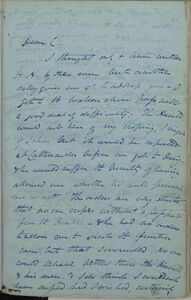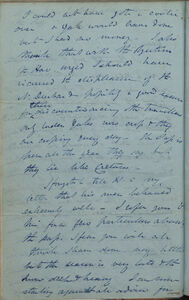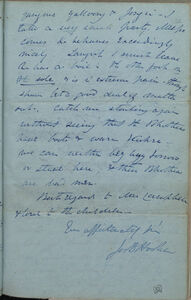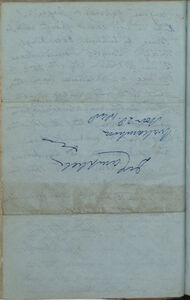Transcript
Dear C*1 I have thought only to have written to H*2 by these men, but another delay gives me 5'[minutes] to address you. I got to the Wallanchoon pass with a good deal of difficulty. The Havild[ar] would not hear of my crossing. I might if I chose but it would be reported at Cathmandu [Kathmandu] before we got to Darjeeling[?] *3 & he would suffer the penalty of having allowed me whether he could prevent me or not. The orders are very strict that no one crosses without a passport from the Durbar - & he had no orders to allow me to visit the frontier even, but that I overruled. No one could behave better than the Havild[ar] & his men. I do think I could not have crossed had I wished, certainly
Dear C*1 I have thought only to have written to H*2 by these men, but another delay gives me 5'[minutes] to address you. I got to the Wallanchoon pass with a good deal of difficulty. The Havild[ar] would not hear of my crossing. I might if I chose but it would be reported at Cathmandu [Kathmandu] before we got to Darjeeling[?] *3 & he would suffer the penalty of having allowed me whether he could prevent me or not. The orders are very strict that no one crosses without a passport from the Durbar - & he had no orders to allow me to visit the frontier even, but that I overruled. No one could behave better than the Havild[ar] & his men. I do think I could not have crossed had I wished, certainly
I could not have got a coolie over, a Yak would have done, but I had no money. I also think that with the objections the Hav[ildar] urged I should have incurred the displeasure of the N. Durbar & possibly a good excuse for their discountenacing other travellers. Only laden yaks now cross & they are crossing every day. The pass is open all the year they say, but they lie like Cretans.
I forgot to tell H. in my letter that his men behaved extremely well. I refer you to him for a few details about the pass. I fear you will all think I have done very little, but the season is very late & the snow deep & heavy. I am now starting against all advice for
Yangma, Yalloong, & Jongri I take a very small party. Meepo comes he behaves exceedingly nicely. [name illeg.]I must leave he has a boil on the other foot on the sole & is in extreme pain, though I have let a good deal of matter out. Catch me starting again without seeing that the Bhoteas [Bhutias] have boots & warm x we can neither beg buy borrow or steal here, & then Bhoteas [Bhhutias] are hard[?] men.
Best regards to Mrs Campbell & love to the children. Ever affectionately yours|JosDHooker [signature]
*4 Dr Campbell [word illeg]
Wallanchoon
Nov 28.1848
1 Dr Archibald Campbell or Dr Arthur Campbell (1805--1874). First superintendent of Darjeeling, India under British rule, an East India Company representative. Former assistant to Brian Hodgson during his time as British Resident in Kathmandu and a great friend of Joseph Hooker. Hooker & Campbell travelled together in Sikkim in 1849 and both were briefly imprisoned by the Rajah of Sikkim. His first name has been subject to debate.
2 Brian Houghton Hodgson (1801—1894). A pioneer naturalist and ethnologist working in India and Nepal where he was a British civil servant. Joseph Hooker stayed at Hodgson’s house in Darjeeling periodically during his expedition to India and the Himalayas, 1847--1851, and named one of his sons after him. They remained lifelong friends.
3 Here Hooker uses an abbreviation possibly for Dorjiling, the spelling he used for Darjeeling.
4. The letter is folded over into three so that this address is written on the blank side of a sheet.
Please note that work on this transcript is ongoing. Users are advised to study electronic image(s) of this document where possible. If users identify any errors in the transcript, please contact archives@kew.org.
Powered by Aetopia



